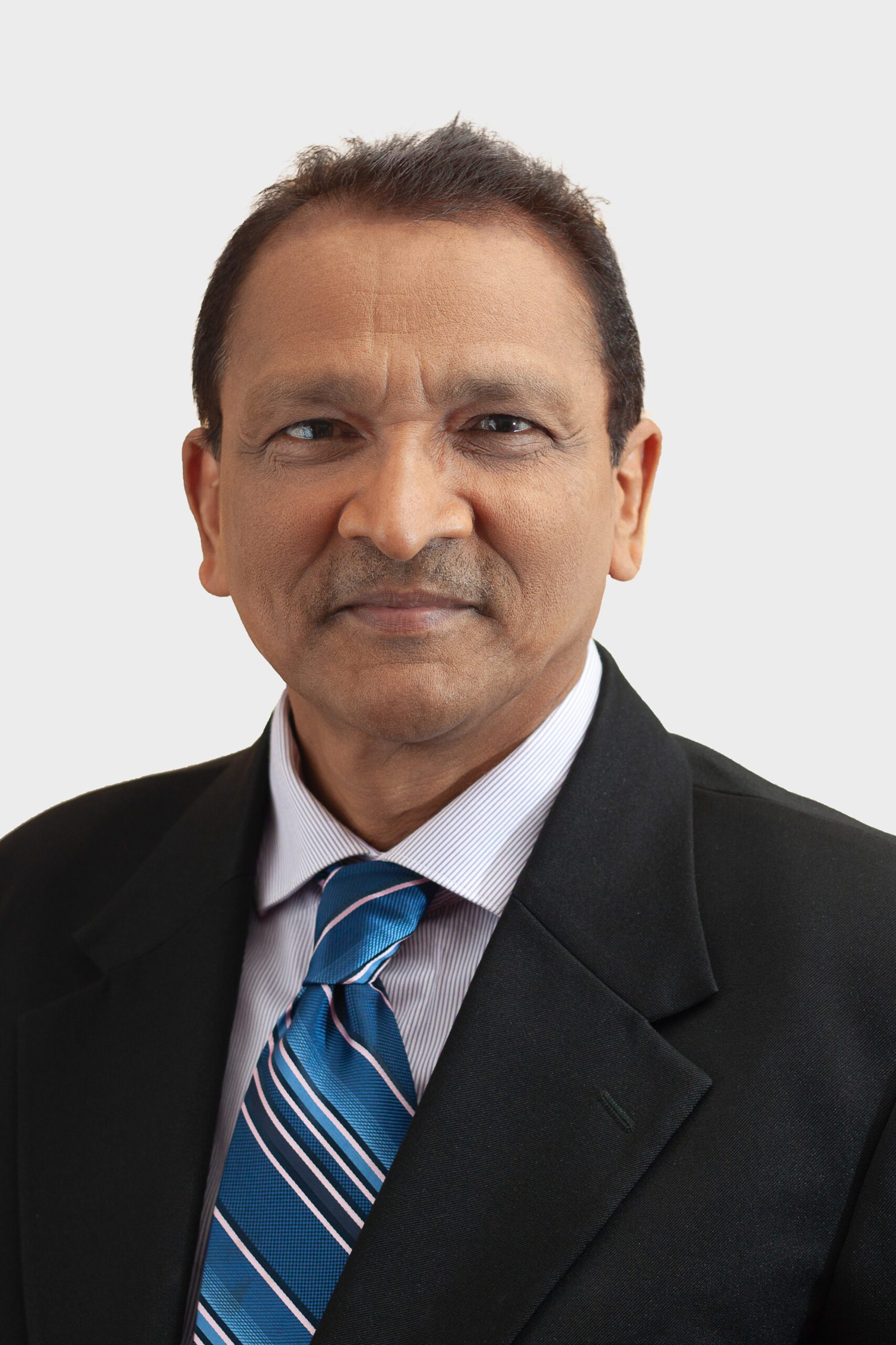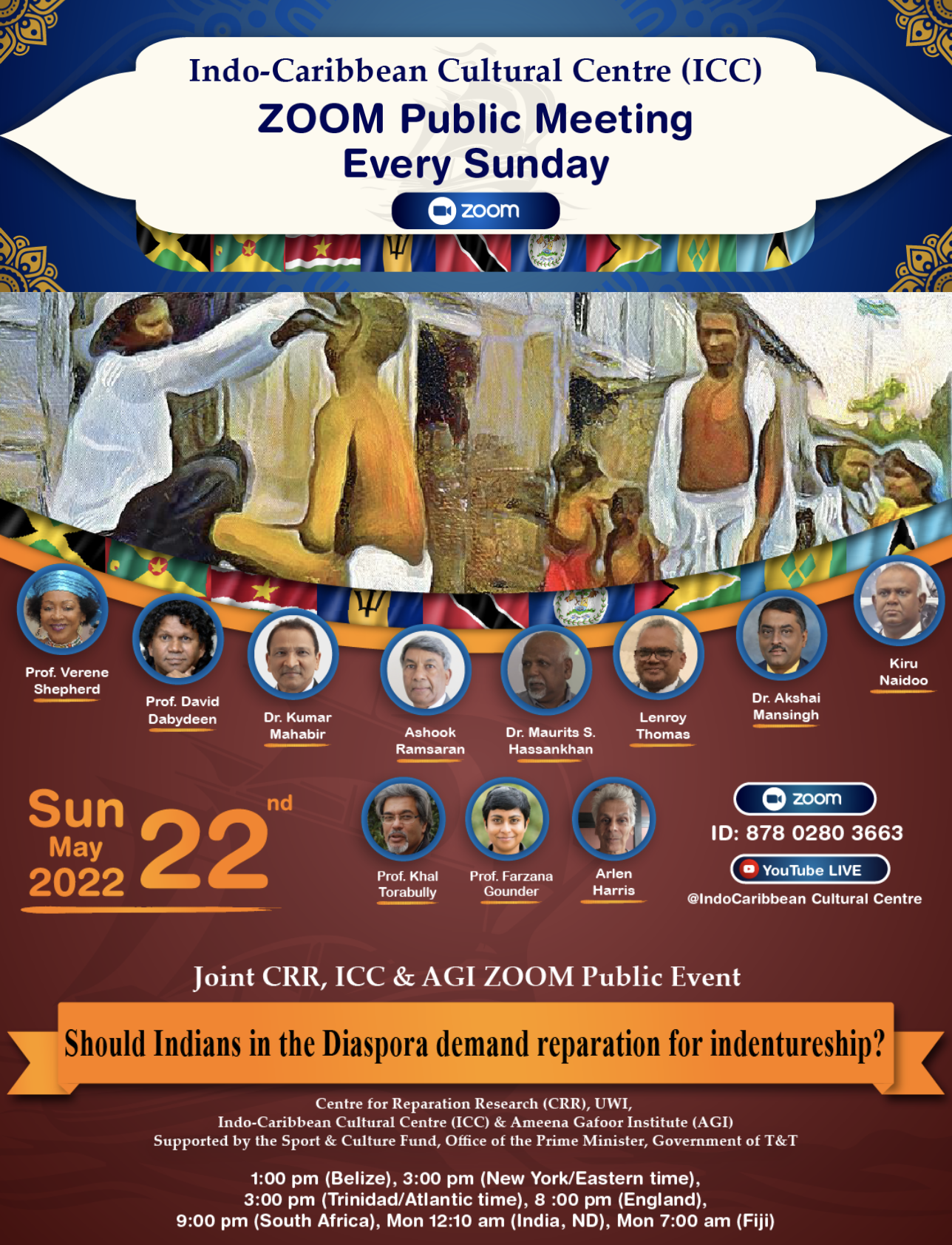The Indo-Caribbean Cultural Centre’s weekly webinars on post-slavery indentured servitude and its legacies
By: Dr. Kumar Mahabir
December 19, 2023

The story of enslaved Africans is well known, but the history of indentured Indian servitude is virtually absent from most narratives. Approximately half a million Indian labourers were brought to the Caribbean between 1838 and 1917. Many of them were deceived, coerced and even kidnapped into indentured servitude, and faced abuse and oppression on the plantations. For many years, Indian indentured labourers and their descendants have been marginalised and overlooked in academic and other discourses even though descendants of these Indian bonded labourers now constitute the largest ethnic groups in former colonies such as Guyana, Suriname (a former Dutch colony) and Trinidad and Tobago. In recent times, the subject of indentured servitude has received some scholarly attention, but this is largely due to the hard work of descendants who have “rescued this vital conversation from the silent pages of history” (Cambridge, n.d.).
It is in this context that the Indo-Caribbean Cultural Centre (ICC) was established in 2010. It transitioned from producing magazines and books into free public webinars on ZOOM in 2020 during the COVID pandemic lockdown. Sunday December 10th 2023 marked the 185th edition of our ICC ZOOM webinar. For 185 unbroken, continuous weeks, we have hosted the program every single Sunday. In the past three years, ten months and one week, we have featured 784 presenters from all parts of the world speaking on 185 topics. This is an ongoing Pan Indo-Caribbean, and Pan Indian-Diaspora Global project funded solely by donations which are few and far between. We are sometimes supported, and partner with, the Ameena Gafoor Institute (AGI) directed by Professor David Dabydeen, formerly of Warwick University in hosting programmes that deal with indentureship and its legacies.
The topics of the meetings are mainly on and about Asian Indians, but the forum is not for Indians only. Our MISSION is to bring the Indian Diaspora in the Caribbean and elsewhere closer for intellectual discussions, unity, solidarity and empowerment weekly on one platform. Our VISION is to achieve a better understanding and appreciation of ourselves in seeking to create a diverse, just, equitable and non-discriminatory society in which Indo-Caribbeans and others thrive harmoniously with other ethnic groups. The forum was created, and is directed, by me, an academic and anthropologist, on the premise that Indians in the Diaspora are often marginal, or marginalised, in the mainstream media, and in formal discourses, and in public groups, organisations and institutions. This platform gives voice and visibility to this minority ethnic group in the region. It follows the Black Lives Matter movement with an objective to eradicate inequality, injustice, institutional discrimination and systemic racism.

Should Indians in the Diaspora demand reparation for indentureship?
On Sunday 22nd May, 2022, our ICC hosted a webinar entitled “Should Indians in the Diaspora demand reparation for indentureship?” in association with The Centre for Reparation Research (CRR) of the University of the West Indies (UWI) and the & Ameena Gafoor Institute (AGI) . It was co-moderated by our regular moderator, Ms. Shalima Mohammed, co-director of the ICC ZOOM project. The speakers – all in support for reparations for Indian indentured servitude in the Indian Diaspora – included ● PROF. VERENE SHEPHERD (UWI) – Director of the Centre for Reparation Research (CRR), University of the West Indies (UWI). Vice-Chair of The CARICOM Reparation Commission; ● PROF. DAVID DABYDEEN (UK) – Director of the Ameena Gafoor Institute (AGI). Former Professor, University of Warwick & Director, Yesu Persaud Centre for Caribbean Studies; ● DR. KUMAR MAHABIR (Trinidad) – Director of this weekly Sunday ZOOM programme. Anthropologist, university lecturer, and author of an oral history of indentureship The Still Cry; ● ASHOOK RAMSARAN (Guyana) – President of Indian Diaspora Council (IDC). Activist in the New York as well as the global Indian Diaspora community of People of Indian Origin (PIO); and ● DR. MAURITS S. HASSANKHAN (Suriname) - Researcher and former Head of the History Department at Anton de Kom University. Co-author of the Historical Database in Suriname.
Also speaking in support of reparations were ● LENROY THOMAS (St. Vincent) – Co-Founder of the SVG Indian Heritage Foundation. Researched records at the National Archives, UK. Author of Stories from our Indian Elders; ● DR. AKSHAI MANSINGH (Jamaica) – Dean, Faculty of Sport, UWI. Senior Lecturer in Sports Medicine. Consultant Orthopaedic Surgeon. Justice of the Peace, Director, Cricket West Indies; ● KIRU NAIDOO (South Africa) – Writer based in Durban with a keen interest in workers’ histories and women’s voices during indentureship. Bangladesh Market remains his centrepiece; ● PROF. KHAL TORABULLY (Mauritius) – Writer, poet, semiologist, and author of 25 books in French, English and Creole. Devised a theoretical framework to include slavery and indenture; and ● ARLEN HARRIS (India) – Award-winning filmmaker with over 30 years’ experience working mainly for British broadcasters such as Channel 4, Channel 5, ITV and BBC TV and Radio.
There were 196 participants in the live ZOOM program, 370 watched the live stream on YouTube, and there have been 527 views recorded to date from all parts of the world on the subsequently-posted video on YouTube. The co-moderator was Professor Verene Shepherd, Vice Chair of the Caribbean Community (CARICOM) Reparation Commission, and Chair of the United Nations Committee on the Elimination of Racial Discrimination.
The Case for Reparations for Post-Slavery Indentured Servitude
In August 2022, as the ICC ZOOM Founder and Director as well as an anthropologist, author and University of Guyana lecturer, I presented a research paper at the Anton de Kom University in Suriname on the case for reparations for post-slavery indentured servitude in the Caribbean and the wider Indian Diaspora. The paper was presented in person at this international conference on Slavery, Indentured Labour and Their Impact on Present Societies.
I attempted to present a compelling case for reparations for Indian indentureship. My presentation was followed by the arrival of the family of Sir John Gladstone in Guyana which marked a significant moment in history. The family expressed their sincere apologies for their ancestor’s direct involvement in both slavery and indentureship in the Caribbean country. John Gladstone was the father of four-time British Prime Minister, William Gladstone.
Contacts: Dr Kumar Mahabir, Trinidad and Tobago, Caribbean
About the author
Dr Kumar Mahabir is a full-time anthropologist at the University of Guyana (UG). He is a former Assistant Professor at the University of Trinidad and Tobago (UTT). He obtained his Ph.D. in Anthropology from the University of Florida (UF). As a doctoral student, he won a Florida Caribbean Institute Award, an A. Curtis Wilgus Grant, and an Organisation of American States (OAS) Fellowship.
